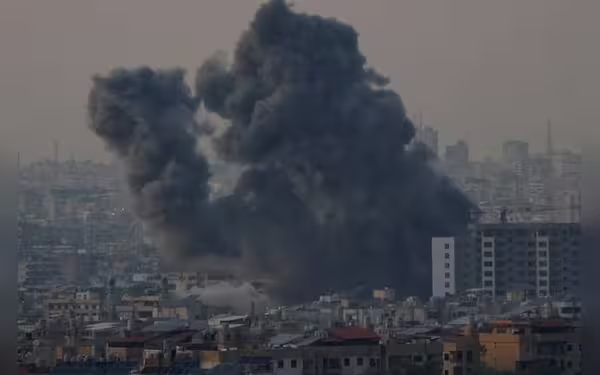Saturday, November 16, 2024 05:52 PM
Israeli Airstrikes Claim 40 Lives in Lebanon Conflict
- 40 casualties reported in Israeli strikes on Baalbek.
- Hezbollah retaliates with missile attacks on Israel.
- Humanitarian crisis deepens amid ongoing violence.
 Image Credits: thefrontierpost
Image Credits: thefrontierpostIsraeli airstrikes in Lebanon result in 40 deaths, escalating conflict with Hezbollah and deepening humanitarian crisis.
In recent days, the conflict between Israel and Hezbollah has escalated dramatically, leading to devastating consequences for the people of Lebanon. On Wednesday, Israeli airstrikes around the eastern city of Baalbek in the Bekaa Valley resulted in the tragic loss of 40 lives, as reported by Lebanon's health ministry. This surge in violence comes amid ongoing hostilities that have intensified since late September, coinciding with the ongoing Gaza war. The situation has become increasingly dire, with Israeli forces conducting extensive bombing campaigns and ground incursions into Lebanese territory.
The Israeli military has targeted strongholds of Hezbollah, particularly in the southern suburbs of Beirut. On Wednesday, residents in these areas were ordered to evacuate several locations, anticipating further strikes. Reports indicate that two waves of bombing occurred, one late Wednesday and another early Thursday, with at least four strikes reported on Thursday alone. However, details regarding casualties from these recent attacks remain unclear.
Hezbollah's secretary general, Naim Qassem, expressed skepticism about the potential for political solutions to end the violence. He emphasized that negotiations could only take place if Israel ceased its attacks. "When the enemy decides to stop the aggression, there is a path for negotiations that we have clearly defined – indirect negotiations through the Lebanese state and speaker (of parliament Nabih) Berri," Qassem stated. This highlights the complex nature of the conflict, where military actions overshadow diplomatic efforts.
U.S. diplomatic initiatives aimed at halting the fighting, including a proposed 60-day ceasefire, have faltered, particularly in light of the recent U.S. elections. The ongoing violence has resulted in over 3,000 fatalities in Lebanon over the past year, with the majority occurring in the last six weeks alone. The humanitarian toll is staggering, as Lebanese rescuers continue to search for survivors in the rubble of destroyed buildings, such as the apartment complex in Barja, where an Israeli strike killed 20 people.
Personal stories from the affected individuals paint a harrowing picture of the conflict's impact. Moussa Zahran, a resident of a destroyed building, recounted the traumatic experience of losing his home and the injuries sustained by his family. His poignant words, "These rocks that you see here weigh 100 kilos; they fell on a 13-kilo kid," underscore the tragic consequences of the violence.
As the situation unfolds, Hezbollah has retaliated by launching missiles at an Israeli military base near Ben Gurion Airport, further escalating tensions. The Israeli military reported that several projectiles crossed into Israel from Lebanon, with some intercepted. Meanwhile, Israeli Prime Minister Benjamin Netanyahu has appointed Israel Katz as the new defense minister, who has vowed to defeat Hezbollah and ensure the safe return of displaced individuals in northern Israel.
In the midst of this turmoil, Lebanon's caretaker prime minister has extended congratulations to the U.S. president-elect, while Netanyahu has welcomed the election of Donald Trump. The political landscape is shifting, and the implications for the ongoing conflict remain uncertain.
As the world watches this tragic situation unfold, it is crucial to remember the human cost of such conflicts. The lives lost and the families shattered by violence serve as a stark reminder of the urgent need for diplomatic solutions and a lasting peace in the region. The hope for a resolution lies in the hands of leaders who must prioritize dialogue over aggression, ensuring that the voices of the innocent are heard amidst the chaos.













